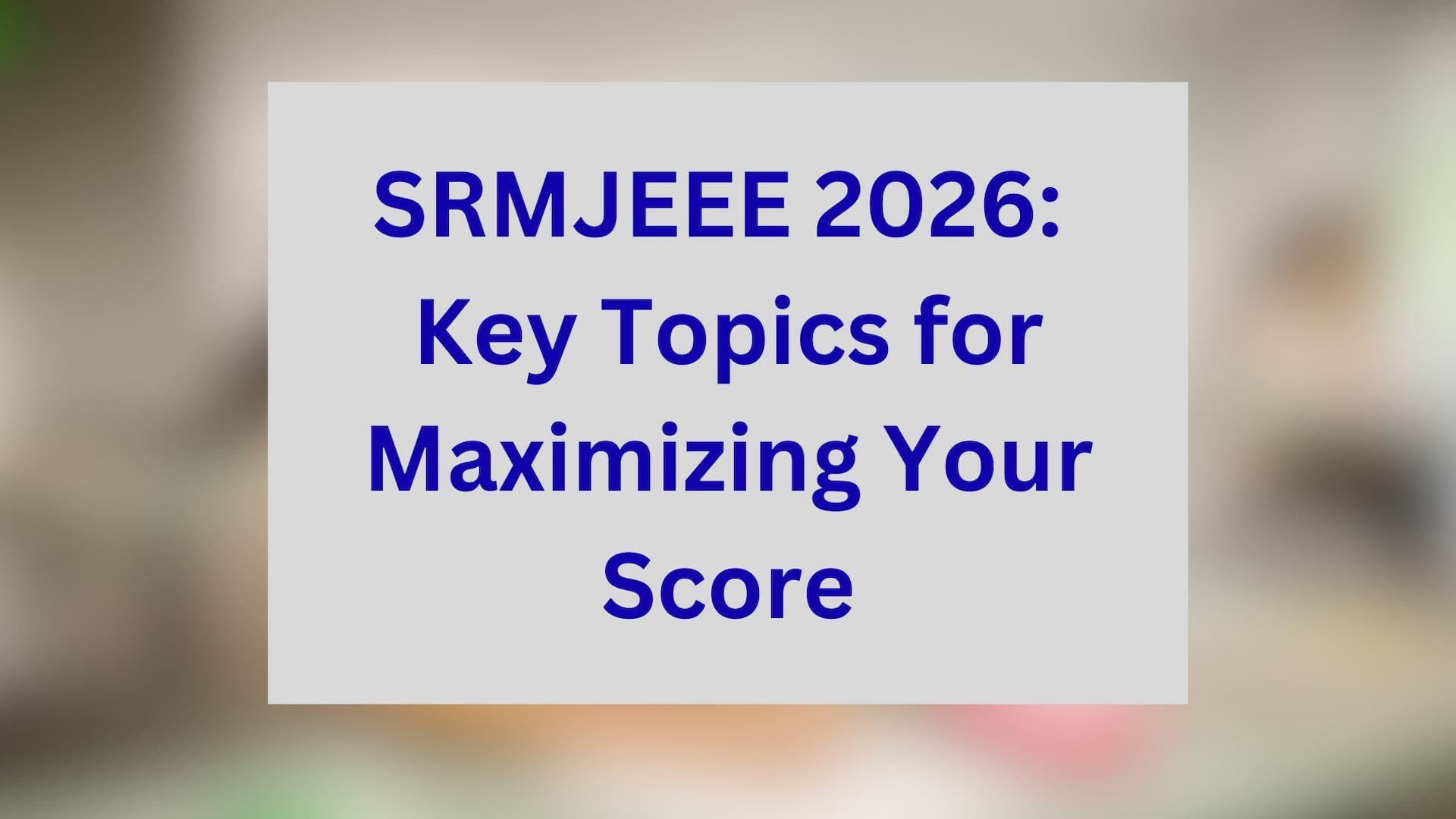SRM University highlights key topics for JEE-level preparation as SRMJEEE 2026 registrations begin
SRM University has officially released the focus areas for the SRMJEEE 2026 exam. Aspiring engineers and biotechnology students must prioritize these high-weightage topics to secure a top rank and admission into the prestigious institution. The blueprint emphasizes Calculus and Modern Physics for technical streams, and Genetics for bio-aspirants. Start focusing your preparation on these key concepts immediately. Learn the subject-wise breakdown now and optimize your study plan for maximum efficiency. Don't waste time on low-priority areas!

The SRM Joint Entrance Examination (SRMJEEE) is a crucial competitive exam for admission into the highly sought-after B.Tech and B.Des programs offered by SRM Institute of Science and Technology (SRMIST) across its campuses. As the exam date for the 2026 session approaches, clarity on the syllabus and key areas of focus is paramount for every aspirant.
SRM University has recently published a detailed advisory highlighting the high-yield topics—those sections and concepts most frequently tested and carrying the most weight—across Mathematics, Physics, Chemistry, and Biology (the last being an option for biotechnology applicants). This information serves as the essential blueprint for effective and targeted preparation. Instead of attempting to cover the vast syllabus uniformly, a strategic approach prioritizing these core areas will dramatically enhance a candidate's chances of securing a high percentile and, ultimately, a coveted seat. This targeted preparation ensures aspirants are dedicating their limited study time to the areas that offer the greatest return on effort.
Mathematics: The Cornerstones of Technical Aptitude
The Mathematics section of the SRMJEEE is designed to test a candidate's logical reasoning and problem-solving capabilities, which are fundamental for all engineering disciplines. The key topics identified by SRM University demand a deep, conceptual understanding and rigorous practice.
High-Priority Mathematics Topics:
- Calculus (Differential and Integral): This is arguably the most critical area. Focus intensely on applications of derivatives (tangents, normals, maxima, minima), definite and indefinite integration techniques, and the area under curves. Mastering theorems like Rolle's and Lagrange's Mean Value Theorem is also essential.
- Algebra (Complex Numbers, Matrices, and Determinants): Strong command over complex numbers (including De Moivre's theorem and roots of unity) and matrices/determinants (including inverse, adjoint, and solving systems of linear equations) is required.
- Coordinate Geometry (2D and 3D): Candidates must revise the concepts of straight lines, circles, parabolas, ellipses, and hyperbolas (Conic Sections). Furthermore, three-dimensional geometry (direction cosines/ratios and planes/lines) is a recurrent high-weightage area.
- Probability and Statistics: Ensure thorough coverage of Bayes' theorem, probability distribution, and measures of central tendency/dispersion for quick scoring questions.
Physics & Chemistry: Foundation and Application
Physics and Chemistry form the core of the entrance exam, demanding both conceptual clarity and the ability to apply principles to numerical problems. The university's guidance focuses on foundational mechanics and core physical/inorganic/organic chemistry segments.
Focus Areas in Physics:
- Mechanics (Laws of Motion, Gravitation, Work, Energy, Power): A fundamental area that tests basic physical intuition. Key concepts include Newton's laws, conservation of momentum and energy, and Kepler's laws of planetary motion.
- Electrostatics and Current Electricity: Focus on Coulomb's Law, electric fields/potentials, capacitors, and the practical aspects of current electricity like Kirchhoff's Laws and basic circuits.
- Optics (Ray and Wave): Understanding reflection, refraction, lenses, mirrors, and wave phenomena like interference and diffraction is crucial.
- Modern Physics (Atomic Structure, Dual Nature, Nuclear Physics): This section, covering topics like Bohr's model, radioactivity, and photo-electric effect, is often high-scoring if concepts are clear.
Focus Areas in Chemistry:
- Physical Chemistry (Thermodynamics and Chemical Kinetics): Prioritize the First and Second Laws of Thermodynamics, spontaneity, Gibbs free energy, and the rate of reaction/order of reaction from chemical kinetics.
- Inorganic Chemistry (p-Block and d-Block Elements): Focus on the properties, trends, and reactions of these block elements, as these topics are heavily featured in the objective format.
- Organic Chemistry (Organic Compounds, Basic Principles): Revise nomenclature (IUPAC), isomerism, and the reaction mechanisms of key functional groups (e.g., Alcohols, Aldehydes, Ketones). Understanding Chemical Bonding is the bedrock for the entire subject.
Biology: The Gateway for Biotechnology Aspirants
For candidates aiming for the highly competitive Biotechnology programs, the Biology section is an alternative to Mathematics and must be approached with equal strategic focus.
Key Biology Topics for Bio-Aspirants:
- Genetics and Evolution: This area is central to biotechnology. Focus on Mendelian inheritance, chromosomal basis of inheritance, molecular basis of inheritance (DNA replication, transcription, translation), and the principles of evolution.
- Human and Plant Physiology: Key systems like the digestive, respiratory, and circulatory systems in humans, and photosynthesis and plant growth in botany must be thoroughly reviewed.
- Biotechnology: Principles and Processes: A direct application area. Focus on recombinant DNA technology, restriction enzymes, cloning vectors, and gene therapy.
Conclusion: Optimizing Your Study Hours
The release of these high-priority topics for SRMJEEE 2026 is an invaluable resource. Aspirants should immediately restructure their study plans to dedicate a disproportionate amount of time to these key areas. Use these topics to guide your practice sessions, mock test analysis, and final revision phase. A well-planned, focused strategy based on the university's own guidance is the surest path to acing the SRMJEEE and securing admission to SRMIST.
For regular updates follow Only Education News. For more details on engineering entrance exams and courses, check here: Engineering Exams List.
